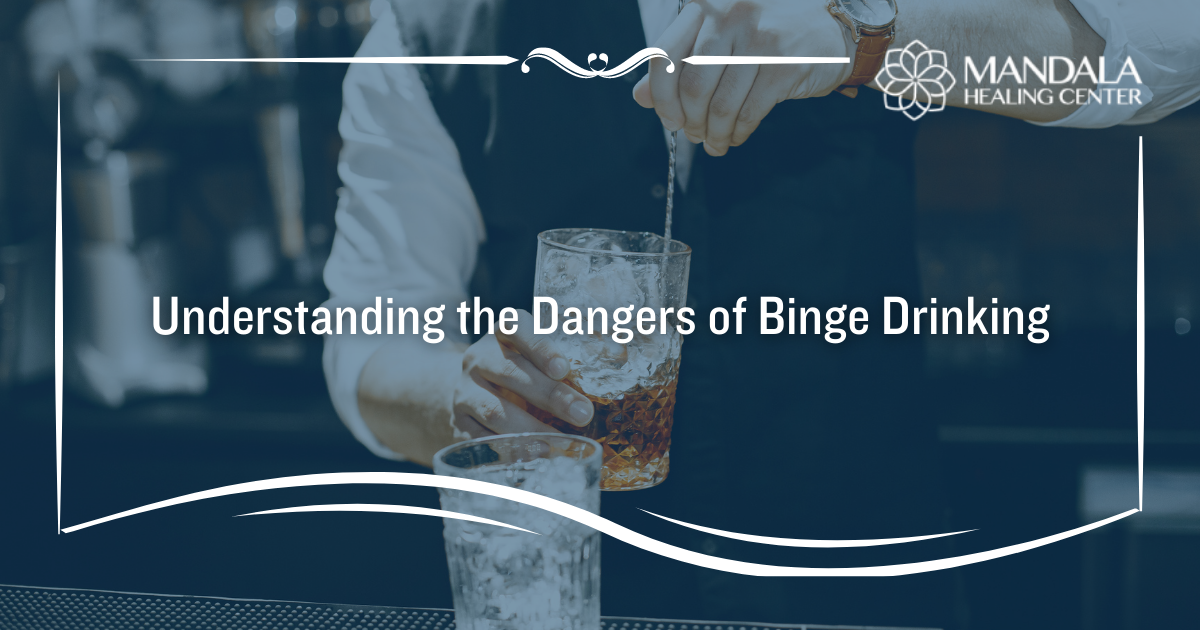Many people consider heavy drinking a normal part of life in the United States. Alcohol is readily available at sporting events, backyard BBQs, happy hours, parties, and celebrations. People may enjoy a few drinks with friends over the weekend, a glass of wine or two with dinner, or cocktails after work.
But regularly drinking too much, especially binge drinking, can lead to serious short and long-term consequences for your physical, mental, and social health. It is important to understand how much is too much–and what to do if you feel your drinking is out of control. Regularly drinking too much, using alcohol to self-medicate, and engaging in binge drinking are signs that you may need treatment to stop drinking.
While many people may think of college students or sports teams when they hear “binge drinking,” drinking heavily over a short period is just as common in older adults. According to the Centers for Disease Control (CDC), about half of all binge drinking episodes occur in people over the age of 35.[1] Because alcohol is readily available in our communities, it is often the drug of choice for many people. Many people do not consider alcohol dangerous, but heavy alcohol use can lead to serious, sometimes life-threatening consequences.
The dangers of binge drinking are real. Help is available. If you need help to stop drinking, please reach out to the caring specialists at the Mandala Healing Center today.
What is Binge Drinking?
According to the CDC, moderate drinking–one drink per day for women and two for men–can be part of a generally healthy lifestyle. Regularly drinking more than the recommended amount may increase your risk of developing certain conditions or engaging in risky behaviors.
Binge drinking means drinking several drinks in a short period. For men, binge drinking is five or more drinks in a two-hour period. For women, this is four or more drinks in two hours. Binge drinking can quickly result in elevated blood alcohol content (BAC). A person is considered too intoxicated to drive safely at 0.08% BAC. Most people would exceed 0.08% BAC during a drinking binge.[2]
Binge drinking does not always look like drunk college students at a frat party. If you were to have a strong cocktail before dinner, two glasses of wine with dinner, and a drink afterward, it could meet or exceed the criteria for a drinking binge.
People may engage in binge drinking without intending to do so, or it may be part of their lifestyle. Understanding the dangers of binge drinking is important so you can make informed choices about your health.
The Short-Term Dangers of Binge Drinking
One of the most immediate dangers of binge drinking is that it can severely inhibit your judgment.
Being intoxicated puts people at risk of:
- Accidents
- Injuries
- Risky sexual behavior
- Loss of consciousness
- Alcohol poisoning
Under the influence of alcohol, people may drive recklessly, and suffer from major or minor accidents like cutting themselves with sharp objects or falling down the stairs. They may attempt to jump from high places, walk across busy roads, or start fires while trying to cook. They may pass out in dangerous places or become violent. They will be unable to care for themselves or others, including children in the home.
Intoxicated people may continue to drink without realizing how much they are consuming–putting them at risk of dying from alcohol overdose. Over time, repeated binge drinking can lead to a life-threatening addiction to alcohol and other severe long-term consequences.
The Long-Term Dangers of Binge Drinking
People who abuse alcohol can face severe and long-term harm to every aspect of their lives. Some of the most common long-term dangers include:
- Sexually transmitted disease
- Unintended pregnancy
- Brain damage
- Chronic diseases
- Alcohol dependence
The physical damage caused by binge drinking can begin as early as a person’s 20s and 30s, depending on how often they engage in heavy alcohol use. Liver and heart disease and high blood pressure are common, serious conditions that can develop in people who engage in binge drinking. People who use alcohol heavily are also at elevated risk of developing certain forms of cancer, including colon, breast, liver, and esophageal cancer.[3]
Brain damage resulting from heavy alcohol use can also begin to show up in a person’s early 20s, depending on when the alcohol abuse began. Early use is also more likely to contribute to alcohol dependence and addiction.
Do I Need Help for Alcohol Addiction?
Many people require addiction treatment to stop using alcohol and stay sober for life. Some signs that you may require alcohol rehab include:
- Needing to drink more to get the same effects
- Experiencing withdrawal symptoms if you stop drinking
- Isolating or losing interest in other activities
- Experiencing financial or legal trouble because of your drinking
- Using alcohol to numb physical or emotional pain
- Feeling unable to socialize without alcohol
- Getting hurt or causing an accident while drinking
- Wanting to stop drinking but feeling unable to
Drinking may seem like a harmless part of your life, but it can lead to serious harm to every area of your life. If you need help to get back in control of your drinking, don’t wait. Get treatment now.
Get Help Today
Mandala Healing Center’s alcohol detox and rehab program in West Palm Beach, Florida can help you or a loved one get your drinking habits under control. Using a holistically-tailored approach, our clinical team aims to help you recover mentally, spiritually, and physically from the depths of your alcoholism.
If you or someone you love requires addiction treatment or support, contact the Mandala Healing Center specialists today.
References:
- https://www.cdc.gov/alcohol/fact-sheets/binge-drinking.htm
- https://www.sciencedirect.com/topics/biochemistry-genetics-and-molecular-biology/blood-alcohol-content
- https://www.ncbi.nlm.nih.gov/pmc/articles/PMC6104963/












